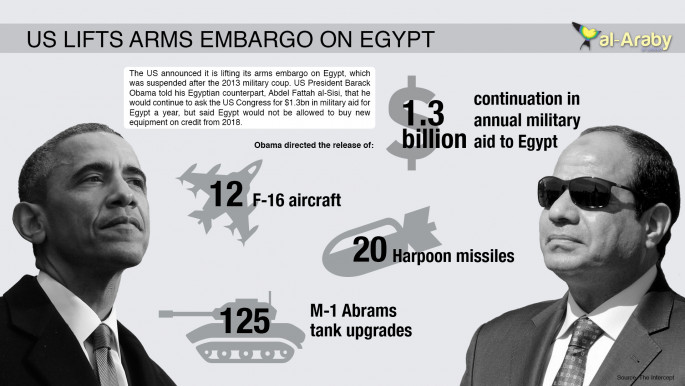
US-Egypt relations were never about Egypt’s domestic policies
There will be an inevitable outcry over what kind of signal this sends to repressive regimes, and what it means for US democracy promotion in the region. But the reality is that Egyptian leader Abdel Fattah al-Sisi, emboldened by unflinching support from key Gulf nations and decades of built-up military assistance, has never really felt under any great pressure from the US. And in turn the Obama administration has never really sought, nor had the means
| There’s no sign Obama is about to move away from a decades long policy towards Egypt. |
to put Sisi under any real pressure or make a genuine push for democracy in Egypt.
The initial decision, in late 2013, to withhold some big ticket items from the annual military aid package was a hollow one. Even if the decision had been taken before June 2013 it would have had no impact on Sisi’s bid for power. F-16s, Harpoon missiles, and tank-kits would’ve been of little use during the coup, and haven’t been needed in maintaining it. For the US it was a safe step to signal concerns over the coup, without putting any real pressure on Egypt’s military leadership.
Human rights advocates have long called for what amounts to a complete suspension of military aid to Egypt until the political situation improves. But the idea that the US would suspend military aid to Egypt entirely over domestic political concerns simply has no basis in the history of relations between the two nations since the annual package of military aid commenced. Not to mention the United States’ flaky history of democracy promotion in the region.
US military aid to Egypt has always been about long term ties; maintaining Egypt as a strong regional ally, fostering security cooperation between Israel and Egypt, and helping to promote a certain regional order. The timing of the Administration’s announcement that the aid would be restored reaffirmed this. Egypt’s participation in ‘Operation Decisive Storm’ shifted the balance for Obama.
Unintentionally, the suspended aid had suddenly threatened to put Egypt’s military under actual pressure on an issue over which the US fully supported it. The US administration had to hurriedly undermine its own very public aid suspension and following attempts to tie the assistance to Egypt’s ‘political transition’. The overwhelmingly anti-Iranian sentiment in Congress will soften the blow of this back down, and ease the potentially awkward task of having to justify restoring military aid to an uncompromising military dictator.
Never about democracy
The most significant part of the announcement to restore military aid was a bid to ‘modernize’ the dynamics of the annual aid package by phasing out cash flow financing(CFF); which allows Egypt to ‘purchase equipment on credit’. It is essentially a form of largesse, a perk the US affords to very few of its allies, and really only serves as a signal of long-term commitment to bilateral relations. Over decades it has allowed Egypt to stockpile big ticket items such as F-16s despite their evident lack of use outside of training exercises, at least until recently. However Egypt’s participation in ‘Operation Decisive Storm’ with a major shipment of military aid still withheld exposed the need, from a US perspective, to adopt a more needs-based approach to military aid rather than simply giving Egypt a blank cheque.
In principle the restructuring is a positive move which gives the US more flexibility in its relationship with Egypt. Despite relations becoming noticeably fractious since the coup in 2013, stockpiled military equipment under cash flow financing left the US with little or no leverage over Sisi's campaign of domestic repression. The inevitable outcome of this predicament was the partial suspension of military aid, a half-hearted policy which has proved ultimately pointless and ineffective.
In theory, a restructured programme would give the US far greater bargaining power with Egypt when threatening to suspend assistance. But the bargaining would still be over Egypt's foreign policy rather than its domestic agenda, and the proposed restructuring simply doesn’t address that. Equally problematic is that the CFF won’t actually be cancelled until FY 2018, opening the possibility that the next US president would simply be able to scrap it before it takes place.
For the moment, the restoring of suspended military assistance signals the United States tacit approval of Egypt’s heightened regional role alongside the United States other undemocratic Middle Eastern allies. Of course, for human rights defenders and those who genuinely want to see a democratic Egypt, it sends the wrong message. But suspending military aid entirely only really pays lip service to the 'right' message.
US military aid to Egypt has never been a tool for punishing Egypt’s strongmen for repression at home. Rather its purpose has historically been to encouraging Egypt’s long-standing defence of a US-friendly order in the region. At the moment, there’s no sign Obama is about to move away from a decades long policy towards Egypt which was never been about promoting democracy.






 Follow the Middle East's top stories in English at The New Arab on Google News
Follow the Middle East's top stories in English at The New Arab on Google News


